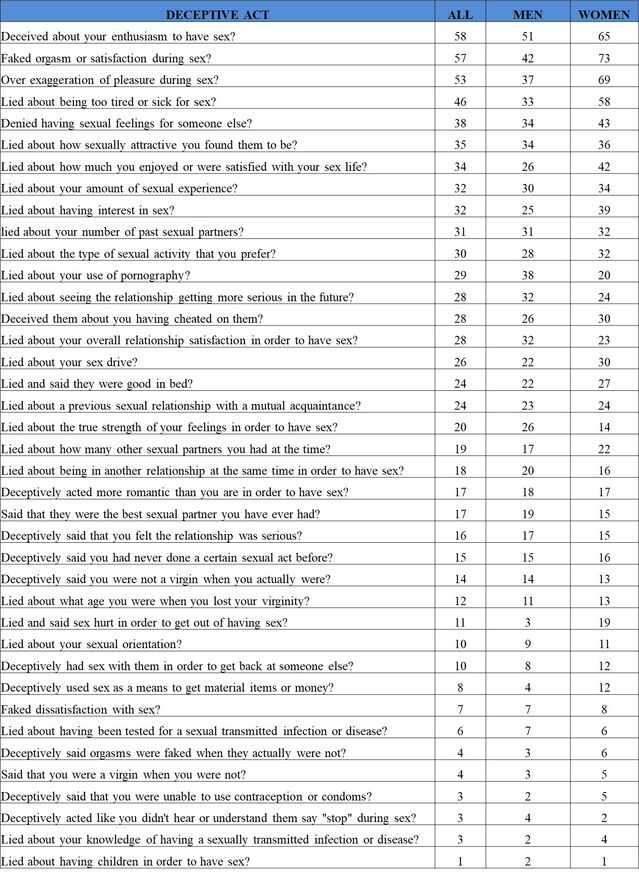Sex
The Most Common Lies People Tell in Their Sex Lives
... and the key differences between the lies men and women tell.
Posted October 15, 2022 Reviewed by Kaja Perina
Key points
- People lie in most social contexts.
- People lie when there is an incentive to do so.
- Most people lie in the sex lives, but men and women lie about different things.
- An honest approach to one's sex life offers the best prospect for a satisfying relationship.
People tend to use dishonesty to get what they want, to avoid embarrassment, to avoid difficult social interactions, or to spare another person’s feelings. Dishonesty is pervasive, occurring in all social contexts. I was curious if people’s sex lives are social contexts in which they deceive. I recently carried out a study in which I asked hundreds of sexually active people if they had ever lied in the context of their sex lives. Not surprisingly, it turned out that almost all of them had been dishonest.
Sex Is Tricky
Sex can be a psychologically fraught domain of life. People come together naked and bearing many of their most tender vulnerabilities. People often have apprehensions and anxieties about their bodies, their sexual skills, or their ability to live up to expectations. They may be concerned about the relationship, their future with the other person, or whether they should even be having sex at all. People also bring the past with them into the bedroom, recalling past sexual experiences, old lovers, and old emotional wounds.
Sex is not a solo endeavor though. People also worry about pleasing their partners or making them feel loved and special. With all of those important goals and social and emotional hazards, people often see complete honesty as dangerous territory.
Sex Lies Study
My students and I wanted to examine whether people use dishonesty to help navigate the complexities of their sex lives. In our first study, we asked a couple hundred sexually active people to anonymously describe an instance in which they had been dishonest in the context of their sex lives. 92% were able to recall such deceit. They reported instances of cheating, faking orgasms, lying about their sexual past, etc.
Based on all of their responses, we were able to create over 100 topics that people reportedly lied about in their sex lives. Next, we created a simple yes/no checklist of all of the sex lies and then asked 330 additional people to complete the checklist, indicating whether or not they had been dishonest about the various topics. Below is a table with the percentage of people who indicated engaging in each type of sexual dishonesty. We included all men and women together, but we also separated the data for men and women.

Selfless Sex Lies?
We noted a few interesting findings in the data. First, it seems that lying in the context of sex is somewhat common. Most of our participants tended to be dishonest. Second, we found that many of the most commonly reported forms of dishonesty weren’t necessarily self-serving. People lied about how excited they were to have sex, they lied about how much they enjoyed sex with their partners, and they lied about how attractive their partners were. When we asked them about their motivations, most indicated that they were trying to make their partners feel good. It seems that prosocial motivations may drive much of the dishonesty in the bedroom.
Gender Differences in Sex Lies
We also found it interesting that there were clear gender differences. Women were much more likely than men to lie about enthusiasm and enjoyment, including faking orgasms. They were also more apt to feign illness or fatigue to avoid sex. Men, on the other hand, were more inclined than women to lie about the true strength of their feelings for their partner and their use of pornography. This gender split is consistent with other research showing that men tend to tell more selfish lies, while women tend to tell more prosocial lies aimed at strengthening relational ties.
Honesty in Bed
People tend to lie when there is an incentive to do so. People lie when telling the truth seems difficult or when telling the truth would impede their goals. Lying seems like the easy way out. However, there is much research on romantic relationships that shows that dishonesty usually creates emotional distance and relational dissatisfaction. If the urge to lie comes up during sex, it might be a good time to examine the basis for that motivation and look for honest ways to achieve the same goal.
Facebook image: Bangkok Click Studio/Shutterstock


